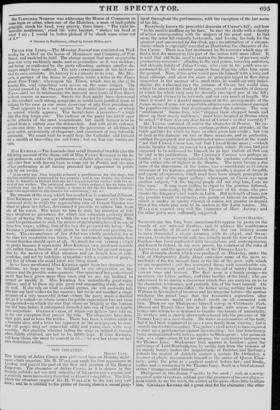MISS KEMBLE.—The Journals that retail theatrical twaddle give the following
account of the divine call of Miss FANNY KEMBLE to the fa- mily profession; and to the performance of Juliet after only two reheav- sals—her first wish having been to come out in Portia, and the idea of her performing at all having preceded her appearance in public only by six weeks.
"At an early age Miss Kemble evinced- a predilection for the stage, but thisVas sedulously repressed by her parents ; and it was during the absence of Mr. C. Kemble in Ireland that she first acquainted her mother with the re viral of her wishes. The principal motive which actuated her to form this resolution was (in her own words) a desire to aid the five hundred indivi- duals who depended on the theatre for subsistence," &c. &c.
The version of the story which has reached us is somewhat different. Miss KEMBLE (so goes our information) being moved with the em- barrassed state in which the approaching ruin of Covent Garden was about to place her father, determined if possible to relieve him from one of his cares. She wrote to him to state her intention of tak- ing a situation as governess, for which her education perfectly fitted her, or of trying the stage, to which she was led by inclination. She asked his permission to seek the means of maintaining herself in one of these two ways ; adding, that of the two she preferred the latter. Ma. KEMBLE'S permission was only given to her earnest and pressing en- treaty. The circumstance of her debut was wholly accidental, for at the time her resolution was taken, it was extremely improbable that Covent Garden should open at all. So much for our 'version ; which we prefer because it represents Miss KEMBLE as a good and sensible girl, rather than a heroine of romance—as led to her present occupa- tion by the motives of filial affection and an honest love of inde- pendence, and not by indefinite sympathies with a regiment of people, very few of whom she could know any thing about.
As we have mentioned Miss KEMBLE apart from her dramatic ex- hibitions, we hope we may be indulged in one observation on her success and its possible consequences. Our opinion of her professional merit has been given more than once, and we are not inclined to retract or modify it. Miss KEMBLE has undoubtedly great cepa-
; and if to these she join great and unremitting study, she will do well. If she rely on what is called genius, she will assuredly fail. She has our best wishes for her success ; but we do not recollect a single instance of a very successful debut—where the party made a decided hit, as it is called—in whose issues the public expectation has not been disappointed—in which the star that shone so brightly in the horizon has not long before it culminated dwindled into one of third or fourth rate magnitude. GARRICK'S case, of which our fathers have told us, is the one exception that proves the rule. The claqueurs have done their part, and so have the critics. There has been a foolish affair of
a bracelet also, and a letter has appeared in the newspapers, to show that old people may act somewhat sillily and young ones write very
sensibly. But plaudits, whether before the stage or behind it, though often lightly obtained, are not to be lightly kept. If Miss KEMBLE will keep them, she must be content in futaa to rest her claim on her own deservings solely.


















 Previous page
Previous page